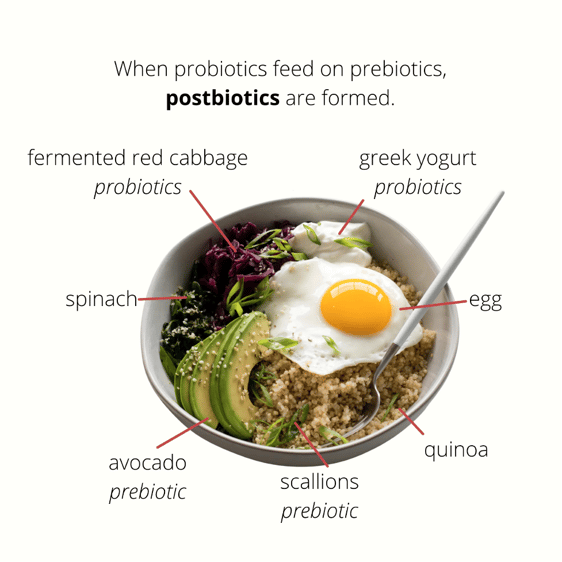While all these “biotics” may sound the same, they each have a specific job. Here’s what they do and where to find them.
PREBIOTICS
A prebiotic is an insoluble plant fiber that feeds the good bacteria in the gut. Fructooligosaccharides, inulin, and galactooligosaccharides are universally agreed-upon prebiotics.
In particular, galactooligosaccharides (GOS) are the most advanced form of prebiotics which belong to a group of particular nutrient fibers that feed and encourage the growth of good bacteria in the gut. Prebiotic fiber resists digestion in the upper gastrointestinal tract, ferments in the large intestine, and fuels the growth of probiotic microorganisms that are linked with optimal well-being.
Sources include: asparagus, dandelion greens, un ripe bananas, oats, onions, garlic, buckwheat groats
PROBIOTICS
When you get an infection, there’s more bad bacteria, knocking your system out of balance. Good bacteria help eliminate extra bad bacteria, returning the balance. Probiotics are strains of bacteria that enhance the good bacteria in your gut. Common species include bifidobacteria and lactobacillus, each of which have their own strains. In our bodies, probiotics are found in the gut, mouth, vagina, urinary tract, skin, and lungs.
Probiotics are not only important for your gut, but also your brain, as research indicates that the gut and brain are connected via the gut-brain axis. Probiotics have been shown to improve mood and cognitive function, as well as reduce stress and anxiety. For example, a 2016 by Frontiers in Aging Neuroscience found that Alzheimer's patients who took milk made with four probiotic bacteria species for 12 weeks scored better on a test to measure cognitive impairment compared with those who drank regular milk.
Sources include: yogurt, kefir, miso, tempeh, kombucha
POST-BIOTICS
When probiotics feed on prebiotics, postbiotics are formed. Remember that our gut is an ecosystem, and a more diverse ecosystem is a healthier one.
Sources include: mix and match your favorite prebiotic and post biotic foods.
Delicious post-biotic meals
- Breakfast: smoothie with yogurt, bananas, nut butter, and greens
- Lunch: miso onion tofu soup
- Dinner: shaved fennel with pickled onion and chickpeas

Sources:
- https://www.google.com/amp/s/experiencelife.lifetime.life/article/why-prebiotics-are-as-important-as-probiotics/amp/
- https://www.ncbi.nlm.nih.gov/pmc/articles/PMC6041804/
- https://www.health.harvard.edu/mind-and-mood/probiotics-may-help-boost-mood-and-cognitive-function#:~:text=Probiotics%20can%20do%20more%20than,called%20the%20gut%2Dbrain%20axis.